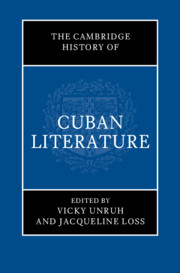Book contents
- The Cambridge History of Cuban Literature
- The Cambridge History of Cuban Literature
- Copyright page
- Dedication
- Contents
- Figures
- Contributors
- Acknowledgments
- Introduction Unfinished Histories
- Part I Literature in the Early Colony
- Part II Cuban Literature’s Long Nineteenth Century
- Part III Literary and Intellectual Culture in the Twentieth-Century Republic
- Part IV The Revolution’s Literary-Cultural Initiatives and Their Early Discontents
- Part V Cuba and Its Diasporas into the New Millennium
- Epilogue
- 46 Teleology, Tempests, and Voicings of History
- Select Bibliography
- Index
- References
46 - Teleology, Tempests, and Voicings of History
from Epilogue
Published online by Cambridge University Press: 31 August 2024
- The Cambridge History of Cuban Literature
- The Cambridge History of Cuban Literature
- Copyright page
- Dedication
- Contents
- Figures
- Contributors
- Acknowledgments
- Introduction Unfinished Histories
- Part I Literature in the Early Colony
- Part II Cuban Literature’s Long Nineteenth Century
- Part III Literary and Intellectual Culture in the Twentieth-Century Republic
- Part IV The Revolution’s Literary-Cultural Initiatives and Their Early Discontents
- Part V Cuba and Its Diasporas into the New Millennium
- Epilogue
- 46 Teleology, Tempests, and Voicings of History
- Select Bibliography
- Index
- References
Summary
This epilogue chapter draws on metaphors of opera to offer a layered meditation on recurrent themes, teleologies, and tropes of identity, exceptionalism, and authenticity – stated, reworked, subverted, abandoned, and resurrected in Cuban literary culture from the end of the nineteenth century into the third decade of the twenty-first. Revisiting such figures as José Martí, Julián del Casal, Alejo Carpentier, Nicolás Guillén, José Lezama Lima, Lorenzo García Vega, Virgilio Piñera, Reinaldo Arenas, Roberto Fernández Retamar, and Antonio José Ponte, among others, and noting the writing of numerous literary women and men of different postrevolutionary generations who echo, mythologize, undermine, or shift directions from these legacies, the chapter asks that readers of Cuba’s cumulative literary history attune themselves to the performative voices through which this operatic literary history unfolds.
Keywords
- Type
- Chapter
- Information
- The Cambridge History of Cuban Literature , pp. 727 - 741Publisher: Cambridge University PressPrint publication year: 2024

